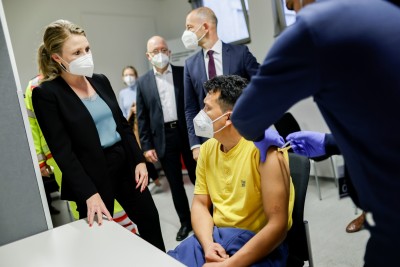Covid in Austria: The Situation Among Refugees and People With Migrant Backgrounds
As the World Health Organization is reporting vaccine inequity for migrants in national vaccine rollouts around the world, Austria is attempting to vaccinate its migrant population by offering vaccinations at the integration centers throughout the country. Read about how this is going.
 Austrian Integration Minister Susanne Raab: "In the fight against the pandemic, we must therefore do everything to reach people living in Austria with the vaccination offer regardless of their origin or knowledge of German." / Picture: © Bundeskanzleramt (BKA) / Andy Wenzel
Austrian Integration Minister Susanne Raab: "In the fight against the pandemic, we must therefore do everything to reach people living in Austria with the vaccination offer regardless of their origin or knowledge of German." / Picture: © Bundeskanzleramt (BKA) / Andy Wenzel
Since October, vaccinations and counseling for refugees and people with a migration background have been taking place in the integration centers in the Austrian federal states and at vaccination centers in cooperation with the federal states.
Interpreters from the Austrian Integration Fund (ÖIF) have been providing support with translations to make access to the free COVID-19 vaccination as easy as possible and to answer questions relating to the vaccination on-site.
The Austrian government says that an initial interim assessment is very positive, and the offer has been very well received.
According to the government, a total of more than 2,500 vaccinations have been carried out so far, most of them in Lower Austria.
Regarding the vaccination effort for migrants, Integration Minister Susanne Raab said, “In cooperation with the federal states, the Austrian Integration Fund has created a low-threshold vaccination offer that has been very well received. Vaccination is the key to how we can fight the virus. In the fight against the pandemic, we must therefore do everything to reach people living in Austria with the vaccination offer regardless of their origin or knowledge of German.”
Although the government says the offer has been “well received,” the numbers suggest the opposite. Considering Austria is home to over 140,000 refugees, 2,500 vaccinations is a rather low figure.
Even though some refugees have potentially been vaccinated at locations other than integration centers, the low number of 2,500 is still rather disappointing.
WHO reports insufficient inclusion of migrants in vaccine rollouts
The World Health Organization (WHO) has reported that there has been a lack of inclusion of migrants in the rollout of national vaccine plans around the world.
According to the WHO, 72% of the 104 plans reviewed did not explicitly include migrants in the rollout, and only 17% explicitly included migrants in irregular situations.
Out of 64 countries that have over 500 refugees, only 53% explicitly included refugees and asylum seekers.
The WHO has reported that some countries have responded to calls for vaccine equity.
The United Nations High Commissioner for Refugees (UNHCR) noted that refugees and asylum seekers have begun to receive vaccinations in 101 of the 162 countries being monitored.
However, the International Organization for Migration (IOM) also reported that many countries were only vaccinating “regular migrants”–those who entered the country lawfully and have adhered to the admission criteria.
Barriers to vaccine access for migrants
The WHO also reported on the numerous barriers preventing migrants from getting vaccinated.
Among these barriers were limited vaccine supply; lack of confidence in vaccine benefits and safety; social influence and norms; lack of trust and practical information about how to obtain vaccines; outreach and language barriers; lack of documentation and complex registration processes; and fear of arrest, detention, or deportation.
Outside of limited vaccine supply, the WHO believes that many of these barriers can be overcome with easily accessible and targeted information campaigns.



